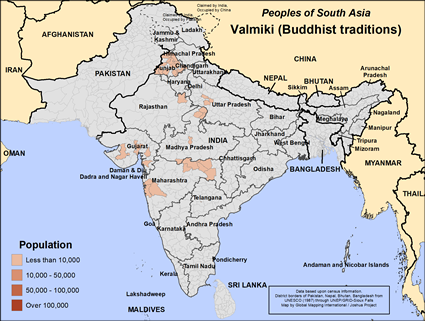Valmiki (Buddhist traditions) in India

Send Joshua Project a photo
of this people group. |

Map Source:
People Group data: Omid. Map geography: UNESCO / GMI. Map Design: Joshua Project
|
| People Name: | Valmiki (Buddhist traditions) |
| Country: | India |
| 10/40 Window: | Yes |
| Population: | 23,000 |
| World Population: | 23,000 |
| Primary Language: | Hindi |
| Primary Religion: | Buddhism |
| Christian Adherents: | 0.00 % |
| Evangelicals: | 0.00 % |
| Scripture: | Complete Bible |
| Ministry Resources: | Yes |
| Jesus Film: | Yes |
| Audio Recordings: | Yes |
| People Cluster: | South Asia Dalit - Valmiki |
| Affinity Bloc: | South Asian Peoples |
| Progress Level: |
|
Introduction / History
The Valmiki are also called Balmiki. They are a caste of street sweepers with low status.
What Are Their Lives Like?
In India Valmiki people face discrimination from a young age. At school their children are given derisive names. They are treated like they cannot learn by public school teachers. Those who work in parks clean things up, then take a stroll in the park only to be told to leave either by high caste members or by the police. If they resist, the police will beat them. Valmiki women are sexually abused by high caste men. There is nothing they can do about it.
Since the root of these problems is in the Hindu based caste system, some Valmiki have changed to a different religion. Most commonly they become Buddhist, but others have adopted Islam or Sikhism.
What Are Their Beliefs?
Buddhism is a major world religion based on the teachings of Siddhartha Gautama or the Buddha, who lived in the 6th and 5th century BC in ancient India. The Buddha taught the Four Noble Truths by which one can gain spiritual knowledge and escape the endless cycles of reincarnation. Theravada, one of the two major branches of Buddhism, declares that by following the Noble Eightfold Path of right intentions and right actions that a Buddhist can achieve nirvana or a state of freedom and salvation. Mahayana Buddhism, the other main branch of Buddhism, asserts that by following the six perfections that a Buddhist can move along the path to Enlightenment. Tibetan Buddhism falls within the Mahayana school.
To most Buddhists, however, these things have far less meaning than their traditional beliefs, which are usually animistic. In animism, evil spirits must be appeased through prayers, sacrifices and rituals. Buddhism allows people to mix Buddhist teachings with traditional religion.
Two of the important Buddhist yearly holidays are Vesak, the Buddha's birthday celebrated in May or June and Bodhi Day, the holiday which commemorates the day that the historical Buddha experienced enlightenment under a Bodhi tree.
What Are Their Needs?
The Valmiki people need to put their trust and identity in the hands of the loving God of Creation who sent his son to make it possible for them to enter the Kingdom of God.
Prayer Points
Pray for the Valmiki people to have the justice they need.
Pray for them to find their identity and sense of worth in the God who gave them life, and the savior who offers them life to the full.
Pray for a "Book of Acts" type of movement to Christ among the Valmiki people.
Pray God will have mercy on the Valmiki, doing whatever it takes to place them in a position to receive him.
Ask God to open the hearts of the Valmiki to the gospel.